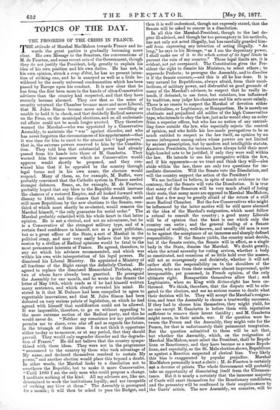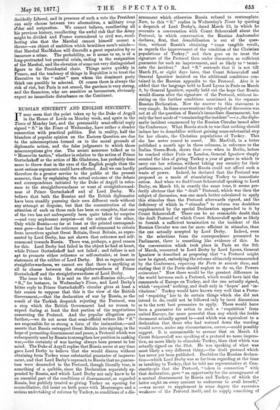TOPICS OF THE DAY.
THE PROGRESS OF THE CRISIS IN FRANCE.
attitude of Marshal MacMahon towards France and to- .1 the great parties is gradually becoming more clear. His own Message to the Senators, the conversations of M. de Poulton, and some recent acts of the Government, though they do not justify the President, help greatly to explain his idea of his own position and his own duties. He has not, in his own opinion, struck a coup d'etat, he has no present inten- tion of striking one, and he is annoyed as well as a little be- wildered by the nearly universal condemnation which has been passed by Europe upon his conduct. It is now clear that he has from the first been more in the hands of ultra-Conservative advisers than the country had suspected, and that they have recently become alarmed. They saw that as the sense of security returned the Chamber became more and more Liberal, that M. Jules Simon became more and more unwilling or unable to hold it in check, and that decidedly Radical measures, on the Press, on the municipal elections, and on all ecclesiasti- cal affairs could not be much longer averted. They therefore warned the Marshal—who was appointed by a Conservative Assembly, to maintain the " war " against disorder, and who has never forgotten the circumstances of his appointment—that it was time for him to exert to the utmost his "legal powers," that is, the extreme powers reserved to him by the Constitu- tion. They told him that substantial power had already passed from his hands into those of M. Gambetta. They warned him that measures which no Conservative would approve would shortly be proposed, and they con- vinced him that if he appealed to the country through legal forms and in his own name, the electors would respond. Many of them, as, for example, M. Buffet, were probably convinced that the Catholic system in France needed stronger defences. Some, as, for example, M. de Fourtou, probably hoped that any blow to the Republic would increase the chances of a restored Empire, and all looked forward with dismay to 1880, and the chance that the Assembly, made still more Republican by the new elections to the Senate, one- third of which must shortly be re-elected, would remove the Marshal himself, "the only guarantee for social order." The Marshal probably coincided with his whole heart in that latter opinion. He is not a clerical, and not an adventurer, but he is a Conservative of the strongest military type, and of a certain fixed confidence in himself, not as a great politician, but as a great officer of the State, a sort of Marshal in the political army, and may very easily believe that his super- session by a civilian of Radical opinions would be fatal to the most permanent interests of France. He agreed, therefore, to any act which his advisers recommended, and which was within his own wide interpretation of his legal powers. He dismissed his Liberal Ministry. He appointed a Ministry of all fractions of the Right except the definitely Clerical. He agreed to replace the dismissed Monarchical Prefects, sixty- two of whom have already been gazetted. He prorogued the Assembly for one month, and he wrote to the Senate the letter of May 18th, which reads as if he had himself written many sentences, and which clearly revealed his mind. He stated in it that M. Dnfaure had been compelled to agree to regrettable innovations, and that M. Jules Simon had been defeated on very serious points of legislation, on which he had agreed with himself that modification could not be allowed. It was impossible, therefore, to go on without appealing to the more extreme section of the Radical party, and this he would never do. "Neither my conscience nor my patriotism permits me to share, even afar off and as regards the future, in the triumph of these ideas. I do not think it opportune either to-day or to-morrow, or at any period, that they should prevail. They would only engender disorder and the degrada- tion of France." He did not believe that the country sympa- thised with these ideas. They were not in the programme "announced to the country by those who took advantage of My name, and declared themselves resolved to sustain My power," and another election would place this beyond a doubt. In other words, the Marshal looks to a dissolution not to overthrow the Republic, but to make it more Conservative. "Until 1880 I am the only man who could propose a change. I meditate nothing of the kind. All my advisers are, like me, determined to work the institutions loyally, and are incapable of striking any blow at them." The Assembly is prorogued for a month ; it will then be asked to pass the Budget, and then it is well understood, though not expressly stated, that the Senate will be asked to concur in a dissolution.
In all this the Marshal-President, though to the last de- gree ill-advised, and though far too peremptory in his methods, has not only not acted illegally, but has carefully guarded him- self from expressing any intention of acting illegally. "As long," he says in his Message, "as I am the depositary power, I shall make use of it to the whole extent of its legal limits to prevent the ruin of my country." Those legal limits are, it is evident, not yet overpassed.. The Constitution gives the Pre- sident the right to dismiss his Ministers, to select others ; to supersede Prefects ; to prorogue the Assembly, and to dissolve it if the Senate concurs,—and this is all he has done. It is very natural for Republicans, always afraid, from their recol- lections, of military power, and distrustful on good grounds of many of the Marshal's advisers, to suspect that he really in- tends, if defeated, to use force, but outsiders, less influenced by tradition, may judge his character and his acts more calmly. There is no reason to suspect the Marshal of devotion either to Clericalism, or Legitimacy, or Bonapartism. He is merely an . obstinate and prejudiced old soldier of the high Conservative type, who intends to obey the law, just sake would obey an order from a superior officer, but who has no notion of any control- ling force outside the law, who especially rejects the control of opinion, and who holds his law-made prerogatives to be as much entitled to respect as the law itself, an opinion by no. means infrequent among rulers whose powers are not limited by ancient prescription, but by modern and intelligible statute. American Presidents, for instance, have always held their most high-handed acts to be justified, if only they were well within the law. He intends to use his prerogative within the law-, and if his opponents—as we trust and think they will—also abide within the law, there are only two questions for im- mediate discussion. Will the Senate vote the Dissolution, and will the country support the action of the President f We are inclined to believe, in spite of much evidence to the contrary, that the Senate will vote the Dissolution. It is true that many of the Senators will be very much afraid of losing their seats, that many more are opposed to Marshal MacMahon, and that a few may be greatly afraid of the return of a still more Radical Chamber. But the few Conservatives who might be influenced by the latter motive will be still more alarmed at the idea of the Marshal's resignation, which must follow a refusal to consult the country ; a good many Liberals will be of opinion that the knot is one which only the country can untie ; and the general feeling of a Senate composed of wealthy, well-known, and usually old men is sure to be against the acceptance of an immense and sharply defined responsibility. If the Senate yields, the country must decide, but if the Senate resists, the Senate will in effect, as a single body in the State, dismiss the Marshal. We doubt greatly, when the actual necessity for voting arrives, whether a body so constituted, and conscious of so little hold over the masses, will act so courageously and decisively, whether it will not rather shift the responsibility on to the shoulders of the electors, who are from their numbers almost impersonal, quite irresponsible, yet possessed, in French opinion, of the only ultimate right. Bonapartists themselves allow that ; and Legitimists, when no King with divine-right has been en- throned. We think, therefore, that the dispute will be rele- gated to the electors, and see no serious reason to doubt what their decision will be. They will accept the Marshal's resigna- tion, and trust the Assembly to choose a trustworthy successor.. If they had to choose him themselves, they might yield, for no one except M. Gambetta is before them with reputation sufficient to remove their latent timidity ; and M. Gambetta might mean, in their minds, war. If the question were be- tween the Person and the Assembly, they might vote for the Person, for that is unfortunately their permanent temptation. But the question submitted to them will be not that, but whether the Assembly, which, on the resignation of Marshal MacMahon, must select the President, shall be Repub- lican or Reactionary, and they have become as a mass Repub- lican, and especially, as the St. Maio election shows, Republican as against a Reaction suspected of clerical bias. Very likely this bias is exaggerated by popular prejudice. Marshal MacMahon personally is not a cleric ; X de Fourtou is certainly not a devotee of priests. The whole Government will probably take an opportunity of dissociating itself from the Ultramon- tanes. But it is nearly a certainty that the immense majority of Cures will exert themselves for the Reactionary candidates, and the peasantry will be confirmed in their suspiciousness by the Cures' action. The new Assembly, we conceive, will be
decidedly Liberal, and in presence of such a vote the President can only choose between two alternatives, a military coup d'Itat and resitrnation. We cannot believe, recollecting all his previous history, recollecting the awful risk that the Army might be divided and France surrendered to civil war, recol- lecting also that the Marshal cannot himself mount a throne—an object of ambition which bewilders men's minds— that Marshal MacMahon will discredit a great reputation by so immense a crime. The probability, as it *seems to us, is of a long-protracted but peaceful crisis, ending in the resignation of the Marshal, and the elevation of some not very distinguished figure to the Presidential chair. Things move quickly in France, and the tendency of things in Republics is to trust the Executive to the "safest" men whom the dominant party think can possibly be selected. Of course there is always the risk of riot, but Paris is not armed, the garrison is very strong, - and the financiers, who are sensitive as barometers, obviously expect no immediate disturbance on the Continent.



































 Previous page
Previous page